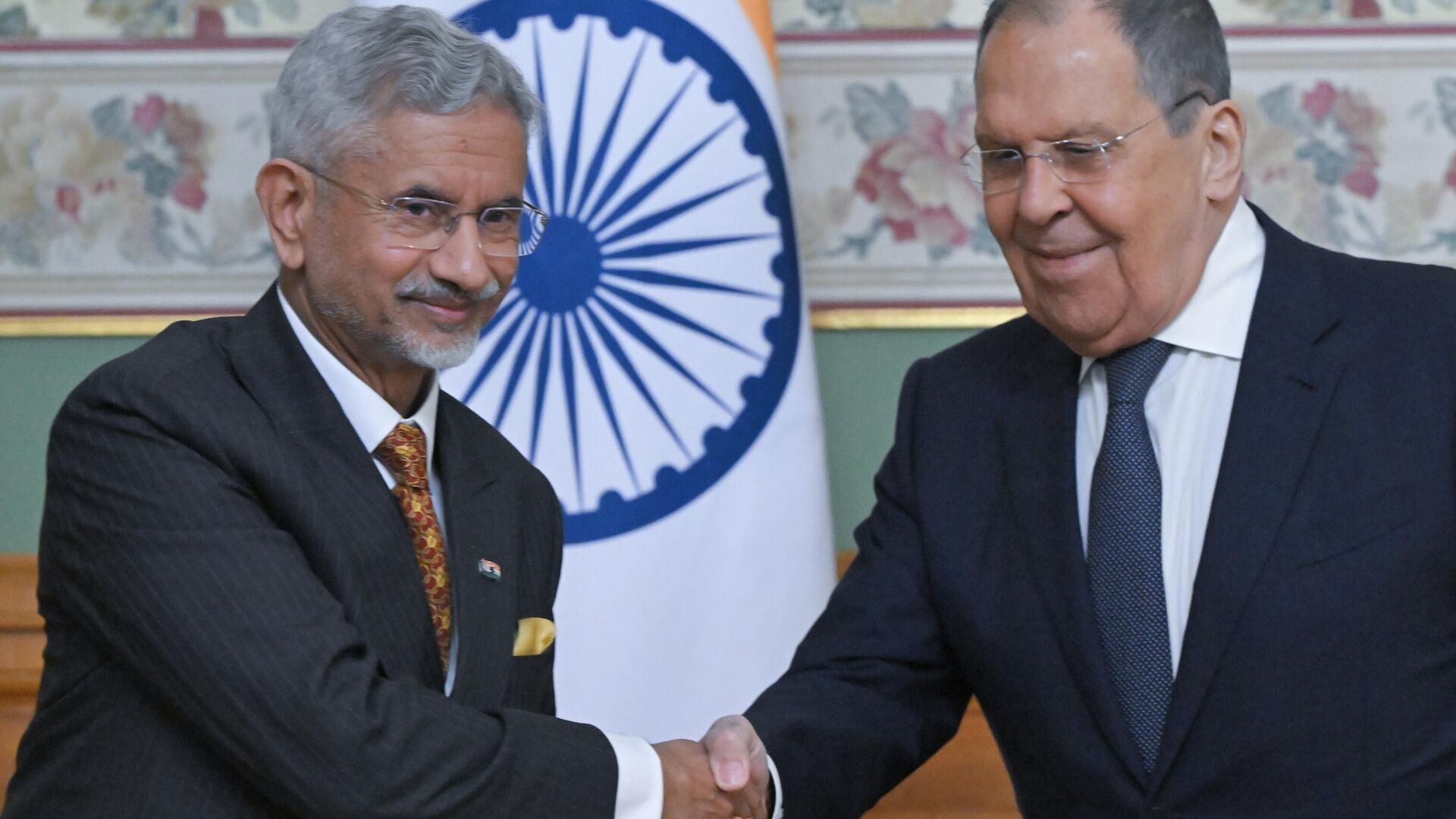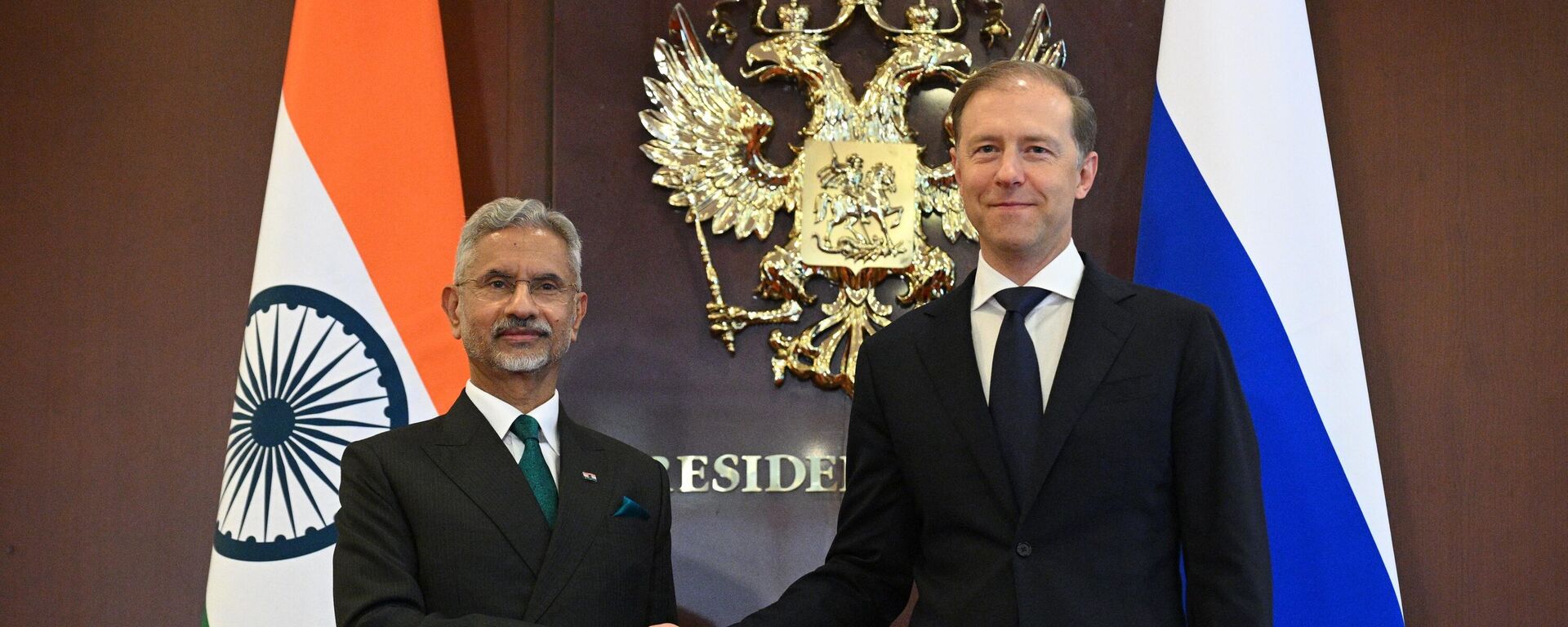https://sputniknews.in/20250821/india-russia-send-a-big-strategic-message-to-the-us---bjp-leader-9640779.html
India, Russia Send a Big Strategic Message to the US - BJP Leader
India, Russia Send a Big Strategic Message to the US - BJP Leader
Sputnik India
Geopolitical convergence, leadership contacts and popular sentiment remain the "key drivers" of an expanding India-Russia relationship, EAM Jaishankar told a joint presser with Foreign Minister Sergey Lavrov in Moscow on Thursday
2025-08-21T20:31+0530
2025-08-21T20:31+0530
2025-08-21T20:31+0530
indo-russian relations
s. jaishankar
sergey lavrov
vladimir putin
india
russia
us
bharatiya janata party (bjp)
shanghai cooperation organisation (sco)
un security council (unsc)
https://cdn1.img.sputniknews.in/img/07e9/08/15/9640337_0:171:3032:1877_1920x0_80_0_0_a87b07b79885803b600b48224f9ce780.jpg
External Affairs Minister (EAM) S Jaishankar's official visit to Moscow, which witnessed wideranging talks with Foreign Minister Sergey Lavrov, has a major strategic message for the US, which has been threatening New Delhi with additional tariffs over purchases of Russian crude, Bharatiya Janata Party (BJP) leader Savio Rodrigues has told Sputnik India.The ruling party politician said that the strategic messaging from India to the US was simple and clear. Rodrigues said that India's push to diversify its exports to Russia and began negotiations for the India-Eurasian Economic Union (EAEU) Free Trade Agreement (FTA) to achieve the $100 billion trade turnover signified Delhi's "strategic assertion". He said that India has shown time and again that it has "multiple avenues" to grow and secure its energy and defense needs.An Indian Commerce Ministry statement on Wednesday published ahead of the 26th meeting of the India-Russia Intergovernmental Commission on Trade, Economic, Scientific, Technical and Cultural Cooperation (IRIGC-TEC) meeting highlighted that the proposed FTA would expand market access for Indian exporters, support diversification into new sectors and geographies, enhance competitiveness against non-market economies, and deliver significant benefits to Micro, Small and Medium Enterprises (MSMEs).At a joint presser in Moscow after their talks, Jaishankar and Lavrov said that both were focused on "lining up" outcomes in the spheres of energy, including fossil fuels and nuclear power, fertilisers, defence infrastructure and labour mobility among others for President Vladimir Putin's visit to New Delhi for the India-Russia Annual Summit in New Delhi later this year. Further, Jaishankar stated that India was "perplexed" by the US policy on Russian crude, noting that the Biden administration had encouraged India to go for Russian oil supplies to stabilise the global market. Jaishankar's comments come ahead of a planned 25% additional tariff on Indian imports entering the US, set to kick in from 27 August as of now.Jaishankar and Lavrov also reiterated their shared commitment to reforms and expansion of the United Nations Security Council (UNSC) as well as India-Russia collaboration at G-20, BRICS and the Shanghai Cooperation Organisation (SCO), which the Indian minister said remained "deep-rooted and forward looking".Jaishankar also called on President Putin at the Kremlin to brief him on the outcomes of his engagements in Moscow before departing for New Delhi.Commenting on the quest for a multipolar world order and the possible revival of the Russia-India-China (RIC) mechanism, Rodrigues noted the significant visit of Chinese Foreign Minister Wang Yi to New Delhi recently, which resulted in major announcements of the boundary question and trade.He said that the thawing of India-China ties was a sign of "diplomatic maturity"."However, India will enter such frameworks only from a position of strength, ensuring our sovereignty and national interest are never compromised," the BJP politician said.Closer cooperation among major non-western powers such as India, Russia and China could serve as an antidote to the hegemony of some foreign powers, retired Ambassador Anil Trigunayat, a veteran Indian diplomat, told Sputnik India.The veteran diplomat stressed the importance of the '3M approach' — mutual interests, mutual sensitivity and mutual respect— in expanding ties between the three Eurasian powers.Dr. Anant Bhagwat, the Founder and President of national security think tank Global Strategic Policy Foundation Pune (GSPFP), told Sputnik India that the US is making a "big strategic mistake" in alienating India, both bilaterally and at a geopolitical level.He said that India has been actively pursuing the trade diversification options to cushion the blow of US tariffs.
https://sputniknews.in/20250820/eam-jaishankar-and-russias-dep-pm-manturov-wrap-up-high-level-trade-talks-9633666.html
india
russia
us
sino-indian border
line of actual control (lac)
ladakh
Sputnik India
feedback.hindi@sputniknews.com
+74956456601
MIA „Rossiya Segodnya“
2025
Dhairya Maheshwari
https://cdn1.img.sputniknews.in/img/07e6/0c/13/138962_0:0:641:640_100x100_80_0_0_2cb44360dbcdf6d84bf4b299cd045917.jpg
Dhairya Maheshwari
https://cdn1.img.sputniknews.in/img/07e6/0c/13/138962_0:0:641:640_100x100_80_0_0_2cb44360dbcdf6d84bf4b299cd045917.jpg
News
en_IN
Sputnik India
feedback.hindi@sputniknews.com
+74956456601
MIA „Rossiya Segodnya“
Sputnik India
feedback.hindi@sputniknews.com
+74956456601
MIA „Rossiya Segodnya“
Dhairya Maheshwari
https://cdn1.img.sputniknews.in/img/07e6/0c/13/138962_0:0:641:640_100x100_80_0_0_2cb44360dbcdf6d84bf4b299cd045917.jpg
india russia news, india russia trade, russian oil exports, trump tariffs, trump tariffs on india, modi putin call, modi putin summit, india russia annual summit, us tariffs, jaishankar lavrov meeting, jaishankar russia visit, india russia intergovernmental commission
india russia news, india russia trade, russian oil exports, trump tariffs, trump tariffs on india, modi putin call, modi putin summit, india russia annual summit, us tariffs, jaishankar lavrov meeting, jaishankar russia visit, india russia intergovernmental commission
India, Russia Send a Big Strategic Message to the US - BJP Leader
Geopolitical convergence, leadership contacts and popular sentiment remain the "key drivers" of an expanding India-Russia relationship, EAM Jaishankar told a joint presser with Foreign Minister Sergey Lavrov in Moscow on Thursday.
External Affairs Minister (EAM) S Jaishankar's official visit to Moscow, which witnessed wideranging talks with Foreign Minister Sergey Lavrov, has a major strategic message for the US, which has been threatening New Delhi with additional tariffs over purchases of Russian crude, Bharatiya Janata Party (BJP) leader Savio Rodrigues has told Sputnik India.
"India’s foreign policy under Prime Minister Narendra Narendra Modi is driven by clarity of purpose and national interest, not by external pressures," Rodrigues said.
The ruling party politician said that the strategic messaging from
India to the US was simple and clear.
"India is not a transactional player, we are a civilizational power. While the US chooses to impose tariffs, India will diversify partnerships to safeguard our economic resilience," he said.
Rodrigues said that India's push to diversify its exports to Russia and began negotiations for the
India-Eurasian Economic Union (EAEU) Free Trade Agreement (FTA) to achieve the $100 billion trade turnover signified Delhi's "strategic assertion". He said that India has shown time and again that it has
"multiple avenues" to grow and secure its energy and defense needs.
"If Washington wants a stronger India as a partner, it must engage with fairness rather than punitive measures," Rodrigues said.
An Indian Commerce Ministry statement on Wednesday published ahead of the 26th meeting of the India-Russia Intergovernmental Commission on Trade, Economic, Scientific, Technical and Cultural Cooperation (IRIGC-TEC) meeting highlighted that the proposed FTA would expand market access for Indian exporters, support diversification into new sectors and geographies, enhance competitiveness against non-market economies, and deliver significant benefits to Micro, Small and Medium Enterprises (MSMEs).
At a joint presser in Moscow after their talks, Jaishankar and Lavrov said that both were focused on "
lining up" outcomes in the spheres of energy, including fossil fuels and nuclear power, fertilisers, defence infrastructure and labour mobility among others for
President Vladimir Putin's visit to New Delhi for the
India-Russia Annual Summit in New Delhi later this year.
Further, Jaishankar stated that India was
"perplexed" by the US policy on Russian crude, noting that the Biden administration had encouraged India to go for Russian oil supplies to stabilise the global market. Jaishankar's comments come ahead of a planned 25% additional tariff on Indian imports entering the US, set to kick in from 27 August as of now.
Jaishankar and Lavrov also reiterated their shared commitment to reforms and expansion of the United Nations Security Council (UNSC) as well as India-Russia collaboration at G-20, BRICS and the Shanghai Cooperation Organisation (SCO), which the Indian minister said remained "deep-rooted and forward looking".
Jaishankar also called on President Putin at the Kremlin to brief him on the outcomes of his engagements in Moscow before departing for New Delhi.
Commenting on the quest for a multipolar world order and the possible revival of the Russia-India-China (RIC) mechanism, Rodrigues noted the significant visit of
Chinese Foreign Minister Wang Yi to New Delhi recently, which resulted in
major announcements of the boundary question and trade.
He said that the thawing of India-China ties was a sign of "diplomatic maturity".
"The RIC mechanism—Russia, India, China—was envisioned as a stabilising forum for Eurasia and Asia-Pacific. While India’s concerns with China on the border remain legitimate and unresolved, economic pragmatism cannot be ignored," he said, adding that a "carefully" revived RIC could serve as a "counterbalance" to disruptive global alignments and strengthen India's role as a global "bridge-builder".
"However, India will enter such frameworks only from a position of strength, ensuring our sovereignty and national interest are never compromised," the BJP politician said.
Closer cooperation among major non-western powers such as India, Russia and China could serve as an antidote to the hegemony of some foreign powers, retired Ambassador Anil Trigunayat, a veteran Indian diplomat, told Sputnik India.
"Since there is a global churn and challenges for nearly every country especially those from the Global South and BRICS, it is imperative that closer cooperation among big powers like Russia, India and China is regenerated to reap the benefits and avoid pitfalls of hegemonic approaches," Trigunayat stated.
The veteran diplomat stressed the importance of the '3M approach' — mutual interests, mutual sensitivity and mutual respect— in expanding ties between the three Eurasian powers.
Dr. Anant Bhagwat, the Founder and President of national security think tank Global Strategic Policy Foundation Pune (GSPFP), told Sputnik India that the US is making a "big strategic mistake" in alienating India, both bilaterally and at a geopolitical level.
"The US tariffs on India over the inability to conclude the first tranche of a bilateral trade agreement (BTA) and the impending tariffs over the purchases of Russian crude will only push New Delhi and Moscow even closer. Knowing the Indian character, we don't like being dictated terms by any foreign power," Dr Bhagwat said.
He said that India has been actively pursuing the trade diversification options to cushion the blow of US tariffs.
"What the US tariffs are doing is that they are accelerating India's push towards Atmanirbharta (self-reliance). And I believe that Russia can play a significant role in the Make in India policy," the Indian thinktank chief said, as he cited the history of Indo-Russian Joint Ventures (JV) in defence, railways, nuclear power and crude among other areas.



